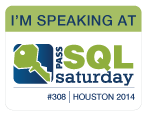How to find a good DBA
You are stupid until proven otherwise
Creating Job Wrecks (Requirements) – Be reasonable, honest, concise specific
Reading resumes – look for job hoppers; red flags things that are impossible; look for language that are trying too hard; Beware “experts”
After 10+ years – if they are listing things like index tables and other basic things, they are trying too hard – they should be doing a lot more than this.
Expert, Proficient, Master – key words to explore what they claim to be an expert in
Question – How are you continuing your education?
Phone screens – initial litmus; measure communication skills and basic knowledge; decide whether or not to bring them in.
Passive interviewing – less you talking, letting them think they should keep talking; when you are being interviewed you can turn this around.
Interview pre-questions – first impressions; small talk before the actual interview; can be used to trip them up later
Questions –
- So what SQL sites you go to?
- If you were going to consider yourself an expert in something what would it be?
- What would you be if you were not a DBA?
- What is it you like about databases?
- Are you self-starter?
- Do you follow any people on twitter?
You can get on a call with 70 users and say anything, but you’d better be right.
Before everything else – explain the format
- What you’ll do
- What you expect
- If there will be labs
- Helpful hints
Say the answer and shut up; If you don’t know say you don’t know.
Question types
- Experience – How long have you been in databases? Are you an expert in anything? Have you put together an HA scenario?
- Knowledge – what is the diffence between delete and truncate? What is a cte?
- Probing – Tell me exactlly how that works
Labs
- Short, discrete pieces of work (1-2 min)
- Nothing that requires specific in-house knowledge
- Something that truly common knowledge
Good: Labs incorportated into the interview
Bad: they have to sit in a room and do stuff
Contract-to-hire is your friend!!!

